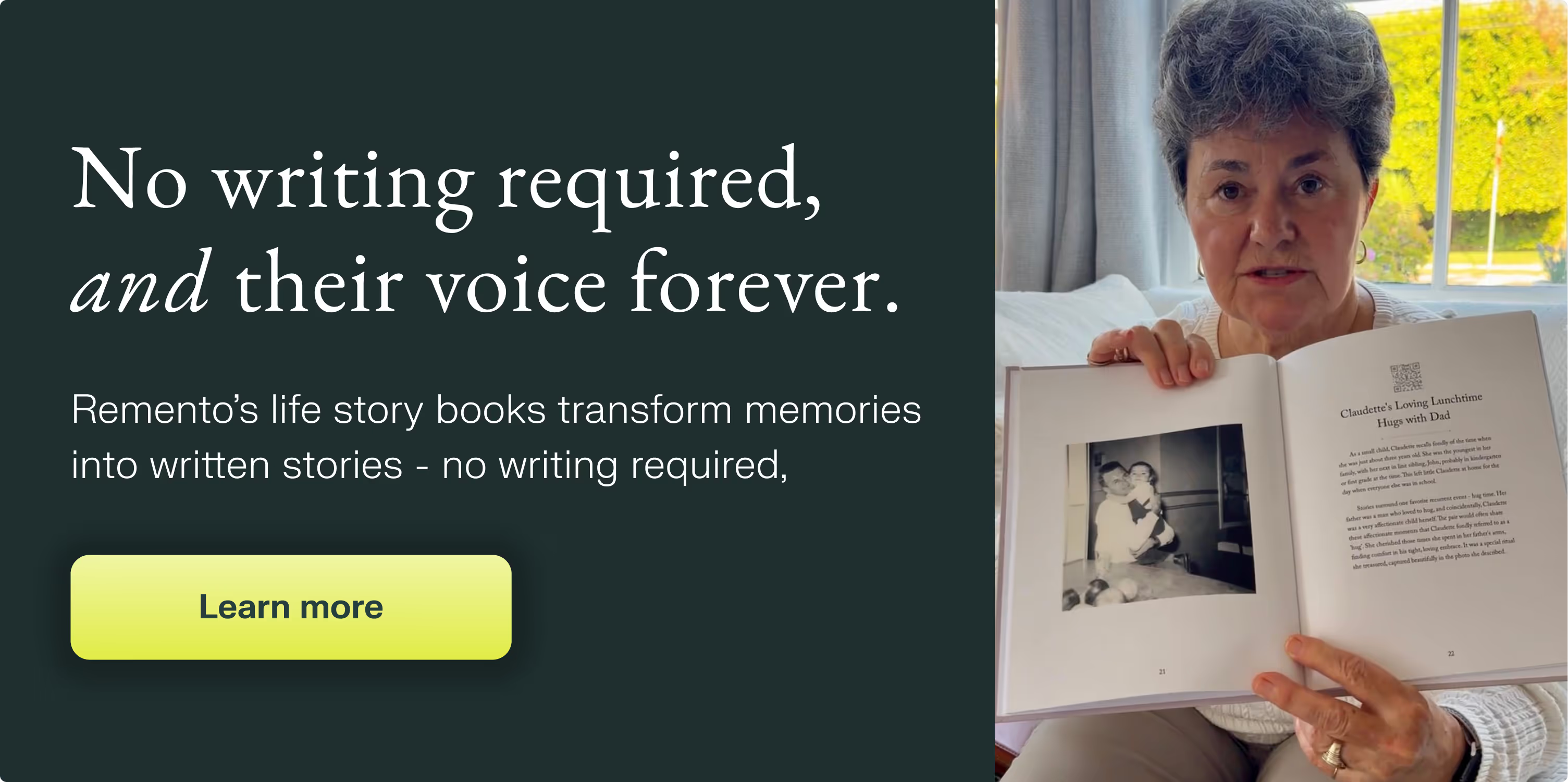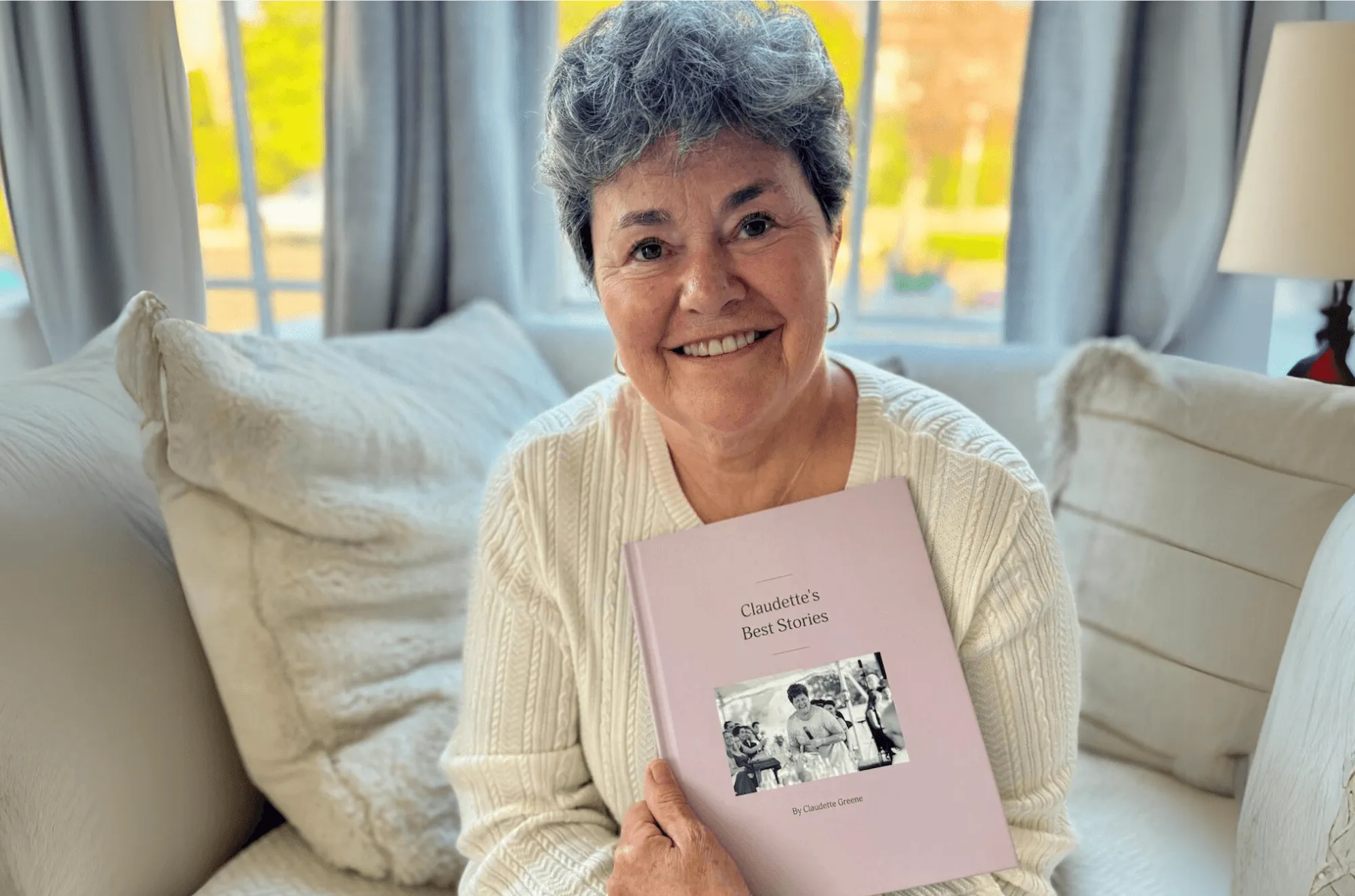Guaranteed to teach you things you never knew.
48 Storyworth® Sample Questions
Storyworth’s prompts spark meaningful reflections, though some families prefer more flexibility. Remento offers customizable, voice-based storytelling for a more personal way to preserve memories.
Family stories connect generations. They remind us where we come from, capture lessons learned, and preserve the humor, quirks, and details that make each family unique.
For more than a decade, Storyworth has helped families turn these stories into keepsake books through weekly email prompts—simple questions that spark meaningful reflection. Each week, a storyteller receives a question, replies by typing or dictating, and at the end of the year, those responses are compiled into a hardcover book.
Recently, other storytelling tools have expanded on this idea. Remento, for example, helps families not only capture written stories but also preserve the voices that tell them. Using speech-to-story technology, Remento transforms voice or video recordings into beautifully written narratives—complete with QR codes linking back to the original audio.
Whether you’re using Storyworth or exploring newer options like Remento, these questions are a wonderful way to start conversations that matter.
Classic Storyworth Sample Questions
Childhood Memories
- What is one of your earliest childhood memories?
- Who was your best friend growing up?
- What games or activities did you love as a child?
- Did you have a favorite subject in school?
- What did your family do for fun when you were young?
- What was your childhood home like?
- Did you have a favorite toy or book?
- What’s a childhood tradition you still remember fondly?
Family and Home Life
- What do you remember most about your parents or grandparents?
- What’s a family recipe that’s been passed down?
- How did your family celebrate birthdays or holidays?
- Did your parents have any sayings or expressions you still use?
- What chores were you responsible for as a kid?
- What was dinnertime like in your house?
- Who in your family made you laugh the most?
Adolescence and Early Adulthood
- What was your first job?
- What music or movies defined your teenage years?
- Who was your first crush?
- What kind of student were you in high school?
- What did you want to be when you grew up?
- What were your favorite hangout spots?
- Did you ever get into trouble?
Love and Relationships
- How did you meet your spouse or partner?
- What was your wedding like?
- What relationship advice would you give younger generations?
- What’s your secret to a lasting relationship?
- How has love changed for you over time?
Career and Accomplishments
- What was your first “real” job?
- What career moments are you most proud of?
- Did you ever have a mentor?
- What lessons did you learn from your work life?
- How did you balance career and family?
Parenthood and Family Life
- What surprised you most about becoming a parent?
- How did you choose your children’s names?
- What family traditions did you create?
- What’s the hardest part about parenting—and the most rewarding?
- What do you hope your children remember about their childhood?
Reflections and Wisdom
- What does happiness mean to you?
- What’s the best advice you’ve ever received?
- What are you most grateful for today?
- How have you changed over the years?
- What do you wish you had known sooner?
- How do you define success?
- What do you want people to remember about you?
Legacy and Perspective
- What do you hope future generations learn from your story?
- What moments shaped your sense of identity?
- How do you hope to be remembered?
Beyond Writing: The Rise of Voice-Preserved Storytelling
Storyworth has made it simple to document family stories in written form. But for many families, hearing a loved one’s actual voice—the laughter, pauses, and emotion—adds another dimension of connection.
That’s where platforms like Remento are innovating. Instead of typing, storytellers can speak naturally. Their stories are automatically transcribed and edited into polished narratives, while the original recordings are preserved alongside each story in the final book. It’s the same spirit of storytelling, but with an added layer of authenticity and warmth.

In the end, both Storyworth and Remento share the same goal: helping families keep their stories alive. The difference is in how those stories are captured—and what future generations get to hold onto.
These questions demonstrate the power of well-crafted prompts to unlock meaningful memories and spark engaging conversations.
Do people like Storyworth's questions?
Storyworth has certainly made an impact in the family storytelling space, and many users have expressed appreciation for their question-based approach. A quick look at online reviews and social media comments reveals a generally positive reception:
- Many users praise the simplicity of receiving a weekly question, which helps overcome the initial hurdle of starting the storytelling process.
- Families often report that Storyworth's questions have led to unexpected and delightful discoveries about their loved ones' lives.
- Some users mention that the questions serve as excellent conversation starters during family gatherings.
However, it's worth noting that user experiences can vary:
- Some find certain questions too generic or not applicable to their family's unique history. For instance, one customer mentioned growing up in a country outside of the US, hence some of the questions didn’t fit her history.
- Others express a desire for more flexibility in the question selection process.
- A few users mention that while the questions are good starting points, they sometimes struggle to develop fuller narratives around them.
Learn more: Storyworth Reviews
FAQs
What is Storyworth?
Storyworth is a year-long storytelling service that sends a new writing prompt each week. At the end of the year, your loved one’s answers are compiled into a keepsake hardcover book.
How does Storyworth work?
Each week, Storyworth emails a storytelling prompt. The storyteller can reply by typing directly into the email or logging in to edit their response. After 52 weeks, the collected stories are printed into a book that can be purchased and shared.
Can you use your voice with Storyworth?
Yes, but only through dictation. Storyworth transcribes speech directly into text without editing or punctuation cleanup. The original audio isn’t saved, so you can’t listen back to the storyteller’s actual voice.
How is Remento different from Storyworth?
Both Remento and Storyworth make it easy to preserve family stories, but they do so in different ways. Storyworth focuses on written storytelling, allowing users to type or dictate their responses, which appear as text in a printed book. Remento, on the other hand, is built around conversation. Storytellers record their stories in their own voice, which are then transformed into written narratives. Each Remento book includes QR codes that link to the original recordings, so families can both read the stories and hear them told in the storyteller’s own voice.
What kinds of questions does Storyworth ask?
Storyworth’s prompts cover everything from childhood memories to family traditions and life lessons. This article’s 48 sample questions are a great starting point for anyone wanting to spark meaningful conversations.
Can multiple family members participate?
Yes. Storyworth allows families to suggest questions or read weekly responses. Remento expands on that idea, letting multiple family members collaborate by adding photos, voting on prompts, and sending encouragement to storytellers.
How much does Storyworth cost?
A standard Storyworth subscription is $99 per year and includes one printed book. Additional copies cost extra.
How much does Remento cost?
Remento also starts at $99, which includes a full year of collecting new stories, a printed hardcover book, and the ability to add unlimited collaborators. Extra books and digital versions are available for purchase.
Which is better for preserving family history long-term?
Storyworth beautifully preserves written reflections, while Remento adds an additional layer of permanence by saving both the written story and the storyteller’s authentic voice. That combination makes Remento especially meaningful for families who want to remember not just what their loved one said, but how they said it.
Final Thoughts
Storytelling connects families in ways few things can. Whether you use Storyworth to capture written reflections or Remento to preserve both stories and voices, what matters most is that these memories are shared, celebrated, and passed on.
Because every family story deserves to be heard, and remembered.
Learn more: Complete Comparison Guide: Remento v. Storyworth

Their stories, forever at your fingertips
Remento’s life story books turn a parent or grandparent’s memories of the past into a keepsake book for the future - no writing required.
Capture priceless family memories today
Join the thousands of families using Remento to preserve family history, all without writing a word.
.avif)
